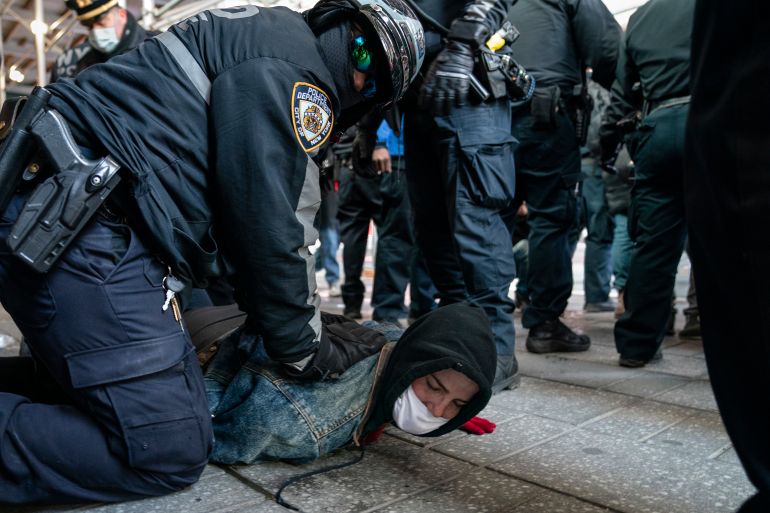NYC council passes bill to limit ‘qualified immunity’ for police
Police reform advocates have targeted such policies, which make it more difficult to sue a police officer.

New York City’s council has passed legislation that would effectively end qualified immunity for police officers in cases of excessive force and unreasonable searches, making it easier for people to sue individual officers.
So-called “qualified immunity” policies shield on-duty officers from being held personally accountable in civil rights lawsuits if their conduct does not violate “clearly established statutory or constitutional rights of which a reasonable person would have known”. The legal concept, which dates back to 1960s’ court rulings, often creates an insurmountable barrier for those seeking to hold officers accountable.
Keep reading
list of 3 items‘We will show up’: Protesters demand justice for George Floyd
Minneapolis agrees to pay $27m to George Floyd’s family
The policies, which do not apply to lawsuits against local, state or federal government, have become one of the targets of police reform advocates across the country amid months of protests sparked by the death of George Floyd, an unarmed Black man, after an officer in Minneapolis, Minnesota knelt on his neck for nearly nine minutes in May of 2020.
A bill passed by the Democrat-controlled US House of Representatives in early March also seeks to curtail qualified immunity as a defence for police. It has not yet been brought to vote in the Senate.
The New York City legislation “would end qualified immunity for police officers in New York City by creating a new local civil right protecting New Yorkers against unreasonable search and seizures and against excessive force and ban the use of qualified immunity, or substantially equivalent immunities, as a defense”, the council said in a statement on Thursday.
It means that qualified immunity could not be used as a defence when residents sue a police officer under those local city statutes, rather than federal or state statutes.
New York City Mayor Bill de Blasio has voiced support for the legislation, which contains other police-reform measures, including giving the city’s independent police oversight board resources and authority to investigate racial bias in policing.
If signed into law, New York City would be the largest jurisdiction in the United States to curtail the qualified immunity defence.
The city’s police unions have vocally opposed the bill, saying ending qualified immunity could have a chilling effect on officer’s willingness to insert themselves into complex and dangerous situations to enforce the law.
In a tweet, NYC Council Speaker Corey Johnson said qualified immunity policies are “rooted in our nation’s history of systemic racism” and “should never have been allowed”.
“I’m proud that we took action today to end it here in NYC,” he said.
Chauvin case
Qualified immunity will be closely watched as the trial of Derek Chauvin, the officer charged with murder and manslaughter in Floyd’s death, begins on Monday.
While the concept does not directly relate to the criminal trial against Chauvin, legal scholars have pointed out that even if convicted, it remains unclear if Chauvin would still be shielded from civil lawsuits filed by Floyd’s family.
The @NYCCouncil just voted to end qualified immunity for police officers, making NYC the first city in the country to do so.
Qualified immunity was established in 1967 in Mississippi to prevent Freedom Riders from holding public officials liable even when they broke the law. 1/
— NYC Council Speaker Corey Johnson (@NYCSpeakerCoJo) March 25, 2021
Joanna C Shwartz, a law professor at the University of California, Los Angeles, has noted that the Floyd family “would have to find cases in which earlier defendants were found to have violated the law in precisely the same way as the more recent cases”.
She has argued the US Supreme Court should rule the policies are unconstitutional in a Washington Post opinion piece.
Ending qualified immunity, she wrote in the wake of Floyd’s death, would “shift the focus in these cases from an arcane exercise in finding a prior court decision with identical facts and, instead, draw attention to whether government officials have exceeded their constitutional authority”.